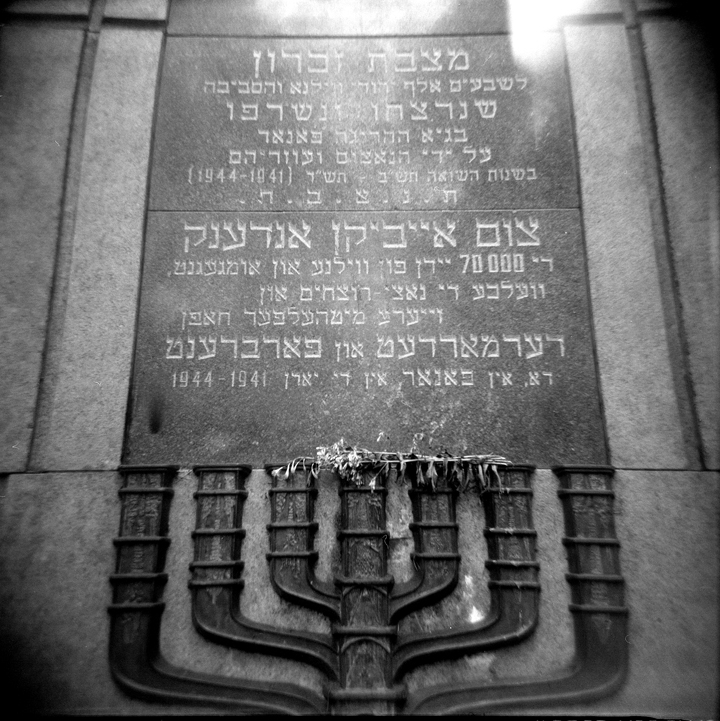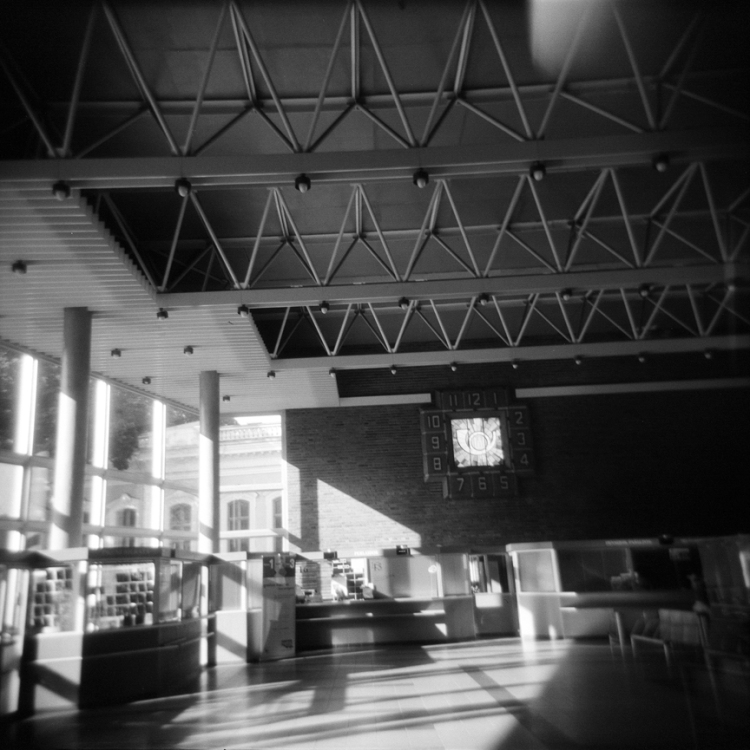Terrific, in-depth article by Nerijus Adomaitis, here: http://uk.reuters.com/article/idUKTRE60J4AJ20100120?sp=true
IN MEMORIAM: ABRAHAM SUTZKEVER
In memory of the great late Lithuania-born Abraham Sutzkever: http://www.jewishideasdaily.com/content/detail/abraham-sutzkever-in-memoriam.
Last hour, when you come, bring strength enough
For me to see a palace in ruined masonry,
To drive my final moments to their given end,
To tap a message to my prisoner soul: Be free!
(trans. C.K. Williams)
Here’s Sutzkever’s testimony at the Nuremberg Trial: http://www.youtube.com/watch?v=cMDa7OcXthw&feature=related
A FEW MORE LITHUANIA PHOTOS
LITHUANIA PHOTOS
Several among the great many photographs taken by SLS-Lithuania participant, the writer, artist and photographer Julia Blaukopf <www.juliablaukopf.com>:
PRESIDENT LITHUANIA NEVER HAD
A very interesting, detailed and engagingly written article, by our SLS-Lithuania permanent faculty member, Laima Vince, here: http://balticreports.com/?p=8386. It is about a man who, many strongly argue, should have been President of Lithuania — the former Soviet prisoner of conscience, and the founder and former leader of the Lithuanian Freedom League, Antanas Terleckas: a legendary name in the Soviet dissident circles. Fascinating life, extraordinary man.
Antanas Terleckas in the 80s (left) and now.
JEWISH LITHUANIA
Some quality photos of the synagogues and a number of the Jewish sites in Lithuania here (forum in Lithuanian): http://www.miestai.net/forumas/showthread.php?t=6856
The authoritative publication on the subject: Dovid Katz’s massive and beautifully turned out “Lithuanian Jewish Culture”: http://www.dovidkatz.net/i_2ljc.htm
PROFESSOR DOVID KATZ
Professor Dovid Katz has an important new op-ed in The Guardian on the former-Soviet Baltic states efforts at holocaust obfuscation:
http://www.guardian.co.uk/commentisfree/2010/jan/08/holocaust-baltic-lithuania-latvia.
His personal websites are: www.dovidkatz.net and http://www.holocaustinthebaltics.com/.
Widely acknowledged as the world’s pre-eminent Yiddish scholar of his generation, the Brooklyn-born, Wales- and Vilnius-based Dovid Katz is one of the wisest, most interesting, thoughtful, learned and mercurially charismatic individuals yours truly has ever encountered. (This, incidentally, happens to be perhaps the primary benefit of being involved with the SLS programs: one gets to meet, and sometimes befriend, the most extraordinary and substantive of people.) Yours Truly’s first sustained awareness of Dovid, not surprisingly, came by way of reading one of his books: to wit, “Words on Fire” — an uncommonly graceful and fluid, highly engaging history of the European Jewry rendered in parallel with and as a reflection of the emergence and subsequent development of the Yiddish language — plucked at random one rainy afternoon, some two and a half years ago, from the overflowing bookshelf in a friend’s Vilnius apartment (the man’s name is Kerry Keys; he’s a prolific, offbeat and unorthodox, boldly experimental poet and writer, and also a voracious reader; originally from the rolling hills of Pennsylvania, he relocated to Vilnius some ten years back and since then has become the fulcrum of the city’s international cultural community). The book quickly proved unputdownable, as it were, and right then and there, while only vaguely considering the possiblity of a future SLS program in Lithuania at that point (see more on some of the reasons behind and rationale for SLS-Lithuania in subsequent posts, hopefully), Yours Truly knew, if also but imprecisely and wistfully, that he would attempt to seek out the book’s author in the event any of those hazy Vilnius-bound projections ever were to start acquiring some concrete shape, crystallizing into an inchoate structure of a would-be program. Months later, that year’s SLS-St. Petersburg participant, M.M. De Voe, the Lithuanian-American from New York, an accomplished writer in her own right, who was assisting SLS at the initial stages of setting up our Lithuania program, having come into contact with one of Dovid’s good acquaintances, initiated the contact between him and Yours Truly; and as a result, a couple months thereafter, he kindly agreed to organize and direct, within the framework of the SLS-Lithuania program, a self-contained, and vitally important, “Jewish Lithuania” cultural and academic component… Thus goes the pre-history of our relationship and his involvement with SLS-Lithuania.
As professor of Judaic Studies at Vilnius Univeristy and the research director of the Vilnius Yiddish Institute (which he founded eighteen years ago), Dovid considers Lithuania his home — as much of one as his life would allow him to have — both as one of the two locales of his residence and the main site of his academic and spiritual pursuits; and he feels it is his right, and his duty, both as a scholar and a decent human being, to speak out, time and again, forcefully and unambiguously and without any regard for the ultra-nationalist officialdom’s certain displeasure at his straightforwardness, against the craven efforts on the part of some of those well-entrenched elements in the country’s power structure to avoid the full accounting for the atrocities perpetrated against the Jewish people of Lithuania during the WWII by a certain segment of Lithuania’s populace. (It should be emphasized here, one feels, that the great majority of Lithuanian people — everyone, virtually, among those Yours Truly personally knows, for instance — are the most terrific human beings one could ever hope to meet: open-minded, lively, possessed of quick curiosity and sound judgment.) Dovid is right, too, in his insistence upon his essential right to continue setting the historical record straight, to call the ultra-nationalists on their strenuous and, frankly, humiliating rhetorical and quasi-conceptual contortions aimed at re-naming, re-positioning, re-upholstering, if you will, the non-negotiable evil of genocide, the horror of Holocaust. Yours Truly, a former Soviet-era samizdat writer, finds his actions admirable: quite simply, you don’t keep your mouth shut in the face of stark injustice, especially one being committed in a place you call home, in wishful hopes of its willing itself into some slow form of self-improvement — it’s just a bad existential strategy.
Some might (and do) say: Look, there has always been a measure of anti-Semitism in Lithuania, in that whole part of the world — and one, frequently, of the most atavistic, swamp-steeped, medieval, Feuchtwangerish, so to speak, variety, too: horrible, of course, but — it’s their own business there, frankly, and history alone could ever straighten this whole ugly thing out, so why not allow history do its magic trick of millennial healing, and leave it be, for now, while in the meantime doing what one can to improve the relations, build the proverbial bridges of tolerance and understanding, between the well-meaning Jews and non-Jews, here and there and everywhere, through various local cultural initiatives on that side of the pond, as well as on this side, via sundry outreach efforts and song-and-dance festivals and such! — Ok, one might respond to that, fair enough, but… in all honesty, and with all due respect, it’s a bit of an unlovely, self-deluding stance, in one’s humble opinion, for you don’t build bridges on rotten or even minimally uncertain foundations, and you don’t embark upon any joyous celebrations of friendship with someone, from within the above-said power structures, say, who’s intent on never looking backwards, no matter how manifestly dire and unresolved the past looming there may be. (“Ok, look: sure, some of the people in this country did some bad, horrible things to the Jews, you know, during the war and all that. They kind of exterminated them. Ok, granted. We admitted as much. Seriously. We apologized for this whole thing, right? Didn’t we? Our former president did, a while ago, when he went to Israel. He said, and this is the exact quote: ‘We are sorry.’ Ok? Sorry. That was a brave thing to do. We’re sorry, ok? Many, if not all, of those Jews were Stalin-supporters, by the way. Just as a matter of historical record. Just so you know… Ok, what else would one want? Would you like us to get on our knees maybe, and say it again, that we’re sorry? Ok, we’re sorry. All right? Quite frankly, we’re a little tired of constantly being guilt-tripped by Jews. With all due respect. Especially those who don’t even live here. What would you want us to do, seriously — put those elderly, decrepit people who supposedly, ok, definitely, killed the Jews — on trial or something? Really? Is that what you’d like? Even considering that most of them are either dead or, like, in their eighties and nineties? Is that what would make you and all them international Jews happy? Even knowing that lots of those Jews who unfortunately perished during the war here were, you know, not to belabor the point, but — communists and Stalin supporters?..” — Oh yes, actually: that would be a really nice first step: putting all those elderly murderers on trial, even those who’re dead, retroactively, and perhaps not necessarily going to the effort of throwing those still breathing in jail, either, but at least forcing them to stand up and admit, urbi et orbi, to having been the rank murderers and sinners in the eyes of the human race. The way it was done in post-war Germany, for instance. And the way it most emphatically has not been done, at least so far, in post-Soviet Russia, with regards to good old Communist Party and the heroic million-strong Satan’s army of the Cheka-NKVD-MGB-KGB forces. That just might be a really sound first step indeed. Until that happens, nothing good, in the way of any genuine movement forward, is likely to occur.)
Yours truly could go into the specific details of the situation under discussion: The benevolent silence in response to the most outrageous publications in the anti-Semitic segment of the nation’s press. The failure to prosecute, or as much as publicly codemn, even one among the former Nazi collaborators and war criminals. The dogged persecution, on the other hand, of three elderlysurvivors of the Vilnius ghetto who, upon their miraculous escape from the latter, had joined the ranks of the Soviet Army-supported partisan brigades. The shameful “double genocide” theory. (“Yes, sure, killing all those innocent Jews was a bad thing to do, no question about it, but — was what Stalin did in Lithuania and to Lithuanians before and, especially, after the war any better?..” Ah! Good question, indeed! Was Stalin more evil than Hitler, or was it the other way around? Is the elephant a stronger free-style wrestler than the whale? Is one absolute darkness darker than the other pitch-blackness? Let’s ponder these hypotheticals, in an unhurried, deliberate fashion, without rushing to conclusion! Is turkey vulture, in its natural behavior, the poor dear, any better or worse than a hyena? Can hyena help being a hyena? Or can it change its ways? Could it go vegetarian, all of a sudden, of its own volition? Did Stalin out-Hitler Hitler, or was it the other way around? It’s true that only the Nazis killed people just because of their being Jewish, but didn’t Stalin kill people just because of their being, you know, people? And since there’re more people in the world than there are Jewish people, strictly speaking, then, you know, conceivably, could it not be argued that the Nazis kind of liberated the majority of people from Stalin in the Blatic states, at the outset of the war? You know? Horrendous as it may sound, on the face of it?.. Hmm! Interesting! Thought-provoking!.. Shifting gears a bit, in continuation of and expansion on the subject — Yours Truly would like to recommend an extremely smart and well-argued article, “The Inflation of Genocide,” by the Lithuanian philosopher, and member of the EU parliament, Leonidas Donskis: http://www.operationlastchance.org/LITHUANIA_32-21.htm) However, all of those painful, difficult issues, and more, are addressed by Dovid, in the above-linked Guardian op-ed, as well as in the rich compendium of materials on his websites, and more exhaustively, and in a more direct language, than Yours Truly ever could hope to come close to.
It’s time to wrap this post up.
To be continued.
“Reminiscences of Joseph Brodsky,” a lecture by Ramunas Katilius
Below is an abstract of a lecture given on Nobel-Prize-winning poet Joseph Brodsky, by a scholar and close friend of his, Ramunas Katilius, during the 2009 SLS Lithuania Program.
Click here to read the whole thing.
“In 1966, soon after his return from the exile to the North of Russia, Joseph Brodsky, then a Russian poet in disgrace, later – an American essayist, Nobel Prize Winner – came to Lithuania, where he found new devoted friends, including us – the Katilius family. Our friendship, especially lively in 1967–72, first in Vilnius and then in Leningrad (St. Petersburg), lasted until his very departure into emigration, and beyond. I was among those who accompanied him while leaving Soviet Union. And I was among those who laid him to rest at San Michele in Venice in 1997. In my lecture I shall try to represent Joseph Brodsky as I knew him, outlining his status in the Soviet society and the inevitability of the conflict, and attempting to describe the background for the Lithuanian motifs in Brodsky’s poetry.”













